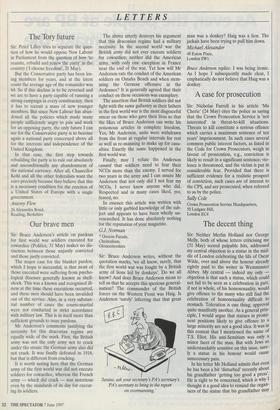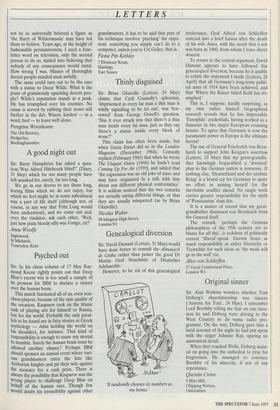The decent thing
Sir: Neither Merlin Holland nor George Melly, both of whose letters criticising me (31 May) scored palpable hits, addressed my central objection to a statue in the mid- dle of London celebrating the life of Oscar Wilde, over and above the honour already rightly paid to the writer in Westminster Abbey. My central — indeed my only — objection is that such a statue, which could not fail to be seen as a celebration in part, if not in whole, of his homosexuality, would give offence to the many who still find the celebration of homosexuality difficult to stomach. Toleration is one thing; approval quite manifestly another. As a general prin- ciple, I would argue that statues in promi- nent positions likely to give offence to a large minority are not a good idea. It was in this context that I mentioned the name of T.S. Eliot. His anti-Semitism was only a minor facet of the man. But with Jews so understandably sensitive on this issue, sure- ly a statue in his honour would cause unnecessary pain. In his letter Mr Holland admits that even he has been a bit 'disturbed' recently about his grandfather 'getting too good a press'. He is right to be concerned, which is why I thought it a good idea to remind the organ- isers of the statue that his grandfather may not be so universally beloved a figure as 'the flurry of Wildeomania' may have led them to believe. Years ago, at the height of fashionable permissiveness, I used a four- letter word on television, only the second person to do so, misled into believing that nobody of any consequence would mind. How wrong I was. Masses of thoroughly decent people minded most awfully.
The same could turn out to be the case with a statue to Oscar Wilde. What is the point of gratuitously upsetting decent peo- ple? Wilde's reputation stands at a peak. He has triumphed over his enemies. No cause is served by rubbing their noses still further in the dirt. Wisest, kindest — in a word, best — to leave well alone.
Peregrine Worsthorne
The Old Rectory, Hedgerley, Buckinghamshire











































































 Previous page
Previous page